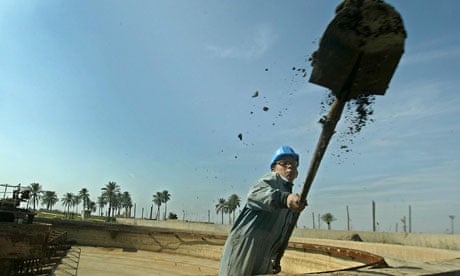The US government has wasted more than $30bn (£18.3bn) on private contractors and grants in Iraq and Afghanistan over the past decade – more than 15% of the total spend – according to a bipartisan group charged with examining the issue.
The figure, described as "sobering but conservative", illustrated the need for significant law and policy changes to avoid such waste in the future, the Commission on Wartime Contracting in Iraq and Afghanistan said.
The body, set up by a Senate vote in 2007 to mimic the work of a post-second world war commission that investigated waste, will submit its report to Congress on Wednesday.
However, some details of its findings were revealed by the co-chairs of the eight-member commission, writing in the Washington Post.
At least another $30bn could be wasted if the governments of Iraq and Afghanistan are unable to keep US-run projects running after the US withdraws or simply choose not to do so, Christopher Shays, an ex-Republican congressman, and Michael Thibault, a former deputy director of the Defence Contract Audit Agency, wrote.
"Tens of billions of taxpayer dollars have been wasted through poor planning, vague and shifting requirements, inadequate competition, substandard contract management and oversight, lax accountability, weak inter-agency co-ordination, and subpar performance or outright misconduct by some contractors and federal employees. Both government and contractors need to do better," they said.
Examples of waste in the report included $40m of US money to finance a prison Iraq did not want and that was not completed, and more than $300m on a power plant in Kabul "that requires funding and technical expertise beyond the Afghan government's capabilities".
In a separate report, released on Monday, the independent Centre for Public Integrity thinktank said $140bn in defence contracts were awarded without competitive tendering last year – almost triple the sum in 2001.
A Pentagon spokesman said the department was "well aware of some of the deficiencies over the years in how we have worked contracts".
Marine Corps Colonel David Lapan said: "We have worked hard over those years to try to correct those deficiencies when we come across them."
However, he defended some practices, saying: "There have been many instances, because of wartime needs, where a lengthy competitive bid contract process does not serve the needs of the war fighters.
"In many instances, it's a matter of saving lives, doing things more quickly because of the nature of conflict."
Shays and Thibault said their report was not intended to be an attack on the use of private contractors in general, particularly given that the US "cannot conduct large or prolonged military operations without contractor support".
They added: "But the costs have been excessive, largely because of a shrunken federal acquisition workforce and a lack of effective planning to use contractors and the discipline of competition."
The report will include 15 recommendations, including the appointment of an official to co-ordinate between the National Security Council and the Office of Management and Budget, and to not automatically assume that every non-core task is suitable for contracting.
Additionally, officials should better scrutinise proposed projects and "cancel or modify those that have no credible prospect of operating successfully".
